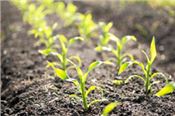Corn Planting Could Face Delays Due To Wet Weather

PHOTO: Thinkstock.com
LEXINGTON, KY.
While corn planting is underway in the state, a soggy forecast over the next week could slow progress. Grain crops extension specialists with the University of Kentucky College of Agriculture, Food and Environment remind growers to wait for dry weather to plant.
According to the National Agricultural Statistics Service, Kentucky producers have planted 19 percent of this year’s crop as of April 16. But a chance of rain is in the forecast for some part of the state nearly every day for at least the next week. This wet period could cause some producers to become impatient with Mother Nature and plant in less-than-ideal conditions.
Planting, working in or driving over wet fields could cause soil compaction. Most soil compaction occurs when a field is at a moisture level that can be tilled but is still a little too wet for optimal tillage.
“Growers should try to avoid conditions that would result in soil compaction,” Carrie Knott said. “Annually, soil compaction reduces corn yields much more than expected and in most cases can be avoided by waiting an additional day or two before planting.”
The key to preventing compaction is waiting until the ground is dry enough to plant. Corn producers can test the moisture level in their fields by molding the soil into a ball with their hands. If the ball will not easily crumble, it’s too wet to plant.
Chad Lee, director of the UK Grain and Forage Center of Excellence, said it is still early in the season. Growers can plant corn up until May 1 in Western Kentucky without taking a hit on yields due to planting time. They can wait until about May 15 in Central and Eastern Kentucky.
“Planting dates are important and do influence yields, but it is only one factor,” he said. “Other factors, such as weather and soil conditions during the growing season, influence yields too and, in some cases, have a greater impact on yields than planting dates. If you plant ‘on-time’ but cause sidewall compaction, your crop will be behind all season.” ∆